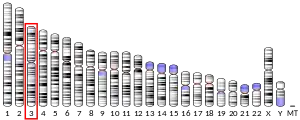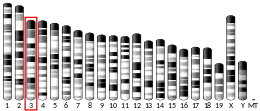SHOX2
Short-stature homeobox 2, also known as homeobox protein Og12X or paired-related homeobox protein SHOT, is a protein that in humans is encoded by the SHOX2 gene.[5][6][7]
Function
SHOX2 is a member of the homeobox family of genes that encode proteins containing a 60-amino acid residue motif that represents a DNA-binding domain. Homeobox proteins have been characterized extensively as transcriptional regulators involved in pattern formation in both invertebrate and vertebrate species.[5]
Clinical significance
Several human genetic disorders are caused by aberrations in human homeobox genes. This locus represents a pseudoautosomal homeobox gene that is thought to be responsible for idiopathic short stature, and it is implicated in the short stature phenotype of Turner syndrome patients. This gene is considered to be a candidate gene for Cornelia de Lange syndrome.[5]
SHOX2 localises on chromosome 3, so it is an autosomal and not a pseudoautosomal homeobox (SHOX, which localises on the PAR1 region of chromosome X and Y, has a pseudoautosomal hereditability).
References
- GRCh38: Ensembl release 89: ENSG00000168779 - Ensembl, May 2017
- GRCm38: Ensembl release 89: ENSMUSG00000027833 - Ensembl, May 2017
- "Human PubMed Reference:". National Center for Biotechnology Information, U.S. National Library of Medicine.
- "Mouse PubMed Reference:". National Center for Biotechnology Information, U.S. National Library of Medicine.
- "Entrez Gene: short stature homeobox 2".
- Blaschke RJ; Monaghan AP; Schiller S; Schechinger B; Rao E; Padilla-Nash H; Ried T; Rappold GA (March 1998). "SHOT, a SHOX-related homeobox gene, is implicated in craniofacial, brain, heart, and limb development". Proc. Natl. Acad. Sci. U.S.A. 95 (5): 2406–11. Bibcode:1998PNAS...95.2406B. doi:10.1073/pnas.95.5.2406. PMC 19357. PMID 9482898.
- Semina EV; Reiter RS; Murray JC (March 1998). "A new human homeobox gene OGI2X is a member of the most conserved homeobox gene family and is expressed during heart development in mouse". Hum. Mol. Genet. 7 (3): 415–22. doi:10.1093/hmg/7.3.415. PMID 9466998.
Further reading
- Gerhard DS, Wagner L, Feingold EA, et al. (2004). "The status, quality, and expansion of the NIH full-length cDNA project: the Mammalian Gene Collection (MGC)". Genome Res. 14 (10B): 2121–7. doi:10.1101/gr.2596504. PMC 528928. PMID 15489334.
- De Baere E, Speleman F, Van Roy N, et al. (1998). "Assignment of SHOX2 (alias OG12X and SHOT) to human chromosome bands 3q25-->q26.1 by in situ hybridization". Cytogenet. Cell Genet. 82 (3–4): 228–9. doi:10.1159/000015108. PMID 9858825. S2CID 19905636.
- Ota T, Suzuki Y, Nishikawa T, et al. (2004). "Complete sequencing and characterization of 21,243 full-length human cDNAs". Nat. Genet. 36 (1): 40–5. doi:10.1038/ng1285. PMID 14702039.
- Zhou W; Chen H; Zhang L (2009). "The PcG protein hPc2 interacts with the N-terminus of histone demethylase JARID1B and acts as a transcriptional co-repressor". BMB Rep. 42 (3): 154–9. doi:10.5483/bmbrep.2009.42.3.154. PMID 19336002.
- Strausberg RL, Feingold EA, Grouse LH, et al. (2002). "Generation and initial analysis of more than 15,000 full-length human and mouse cDNA sequences". Proc. Natl. Acad. Sci. U.S.A. 99 (26): 16899–903. Bibcode:2002PNAS...9916899M. doi:10.1073/pnas.242603899. PMC 139241. PMID 12477932.
- Kimura K, Wakamatsu A, Suzuki Y, et al. (2006). "Diversification of transcriptional modulation: large-scale identification and characterization of putative alternative promoters of human genes". Genome Res. 16 (1): 55–65. doi:10.1101/gr.4039406. PMC 1356129. PMID 16344560.
- Yerges LM, Klei L, Cauley JA, et al. (2009). "High-density association study of 383 candidate genes for volumetric BMD at the femoral neck and lumbar spine among older men". J. Bone Miner. Res. 24 (12): 2039–49. doi:10.1359/jbmr.090524. PMC 2791518. PMID 19453261.
- Ravasi T, Suzuki H, Cannistraci CV, et al. (2010). "An atlas of combinatorial transcriptional regulation in mouse and man". Cell. 140 (5): 744–52. doi:10.1016/j.cell.2010.01.044. PMC 2836267. PMID 20211142.
- Hillman RT; Green RE; Brenner SE (2004). "An unappreciated role for RNA surveillance". Genome Biol. 5 (2): R8. doi:10.1186/gb-2004-5-2-r8. PMC 395752. PMID 14759258.
This article incorporates text from the United States National Library of Medicine, which is in the public domain.




